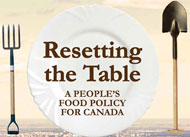Food ideas
It’s spring, right? And you want to know what’s in season in Ontario now.
Veggies:
Beets, cabbage, carrots, greenhouse cucumbers, greenhouse lettuce, mushrooms, onions, parsnips*, greenhouse peppers, rutabaga, sprouts, sweet potatoes and greenhouse tomatoes.
Fruits:
Apples and rhubarb.
According to Foodland Ontario, the above foods are “scheduled” for April. But with the slow spring we have this year, it might be better to expect them to arrive closer to May. All the same, it’s almost May so keep an eye out!
*Not a parsnip fan? Try this recipe given to me by my old CSA, La ferme de Bullion, in Québec. It’s surprising how eating a good-for-you, local food prepared in a new way can make you feel like a super star.
Parsnip Pancakes
4 cups parsnip peeled and cubed
2 eggs slightly beaten
1 onion finely chopped
1 tsp salt
1 tsp oil
1/2 cup finely chopped walnuts
1 tsp dried tarragon
2 cups breadcrumbs
Steam parsnips until tender (10-15 mins). Sauté onion in oil, add tarragon.
Mash parsnips; add onion, egg, salt and nuts and mix well. Form into 12 patties.
Coat with breadcrumbs. Bake at 350F for 20 minutes.
Mmm mm.
(Ontario garlic might make a good addition too.)
Canada now has a citizen-driven food policy.
The People’s Food Policy (PFP) was unveiled this past week as a plan that addresses some of this country’s most confounding food-related inconsistencies, including why close to 2.5 million Canadians don’t have enough to eat, while one in four of us is considered obese.*
What is new here is that the PFP looks at our food system and recognizes its inter-connectedness with issues of health, hunger, climate and agriculture. Food and agri are often associated, but to include health, hunger and climate in the picture is nothing short of revolutionary for this country.
I guess that’s what happens when regular citizens get involved. The PFP consulted regular Canadians, farmers, fishers and organizations that deal with food security.
What did the inquiry find? Basically that our food system is failing us, and the status quo is not an option, says Amanda Sheedy, PFP coordinator.
Key PFP recommendations:
- Localizing the system so that food is eaten as close as possible to where it is produced.
- Supporting food providers in a widespread shift to ecological production, including programs to support new farmers getting on the land.
- Enacting federal poverty elimination and prevention programs to ensure Canadians can better afford healthy food.
- Creating a nationally-funded children and food strategy.
- Ensuring that the public, is actively involved in decisions that affect the food system.
Here, here!
The new People’s Food Policy site just launched, so take a minute to sign their pledge for a healthy, fair and ecological food system.
*<rant>
Of course, this might be due the plethora of inexpensive, nutrient-poor, food-like products that pass for food on supermarket shelves that fill us up but leave us malnourished.
</rant>
Please check out a wonderful post on Folks gotta eat about a new grant by the McConnell Foundation to help strengthen regional food economies.
This is inspiring stuff. We need it, and we need more of it.
Walmart goes organic. This has been so in the States for a few years now and in Canada for about one year. The articles are out there, but what does it mean to the organic movement?
This was brought up at the Canadian Organic Growers conference closing panel discussion this past weekend.
You might be forgiven if your first reaction to Walmart and organic is one of cynicism. But step back for a moment and consider the following.
If the organic movement is entering the mainstream, it will reach more people, some of whom may never have eaten an organic anything before.
This could be a first step for many new eaters.
It also means more fields will be devoted to chemical-free farming, and more square kilometres of our country’s soil will be able to heal.
Will this change the organic movement? Only time will tell. It may well weaken the movement. After all, Walmart’s reputation of low-balling businesses out of business is unlikely to change. Could this then put organic farms out of business?
I say that if we want to heal out systemically ailing (and failing) food supply chain, we need to start somewhere. I’m choosing to see this as a sign of the organic movement’s success.
The new agriculture is growing ecologically, socially and financially. If organics goes mainstream, really mainstream, and therefore becomes more affordable (and attracts even more followers), then perhaps the hard(er) core grassroots folks among us could then turn our attention to the embattled fight against GMOs, which our current organic standards do not even consider.
Just a thought.

The Canadian Organic Growers conference is taking place this Saturday, February 19, 2011 at the U of T Conference Centre. I had the pleasure of attending this event last year, and wouldn’t miss it for anything this year. I am even dragging my LocalFoody colleague, François — I lie, he’s equally psyched — along for the informative, enjoyable and very tasty ride (they serve a great lunch).
This year’s keynote speaker is Canadian author Silver Donald Cameron, who will be sharing some of his insights into Bhutan’s new economic model of “Gross National Happiness”, a system that values a more holistic interpretation of “quality of life” than we might be used to and includes the organic certification of the entire nation’s agricultural system.
Nice.
Panel discussions include GMOs, heritage seeds, Walmart, bread & beer, beauty products and more.
Where: U of T Conference Centre, 89 Chestnut St.
When: Saturday 19 February 2011, 9 a.m. – 5 p.m.
Cost: $85 (Worth it, and students, retirees and the unwaged get a special rate.)
If you care about your food and want to be informed of the issues, this is a must-go-to event.
It’s another new year and some of you might have decided to entertain a resolution or two. After avoiding such things for the past several years, I decided to creep into 2011 on a quieter, more contemplative note and have come up with a few priorities for myself.
On the topic of changing habits, and of course, more specifically, food habits, check out the TedxHart House lectures of last month, The Future of Food.
Jason Qu, recent graduate and coordinator of U of T’s campus agriculture program, discusses campus food initiatives, and suggests a more holistic approach to food is the starting point that will stick.
The Secret Classroom
Lauren Baker, Director of Sustain Ontario, discusses changing the farming system and creating more opportunities for the little guy. Here, here!
10 Good Food Ideas
I can’t find the lectures of the other speakers, Dan Donovan (chef and product developer for Ontario’s Own), and chefs Jeffrey Crump and Bettina Schormann, of Ancaster Mill.
If anyone has those links, please share!
Bonne année!
 You might be wondering what’s up with our logo. And you wouldn’t be the first. After all, as a general rule, people don’t eat grass, and our mantra here at LocalFoody is “Helping People Find Good Food”. So, what gives?
You might be wondering what’s up with our logo. And you wouldn’t be the first. After all, as a general rule, people don’t eat grass, and our mantra here at LocalFoody is “Helping People Find Good Food”. So, what gives?
Well, to quote Michael Pollan “All Flesh is Grass”. This is the title of Chapter 8 in The Omnivore’s Dilemma, the book that drove me to create LocalFoody, and the sense of it touched me profoundly.
Grass is at the foundation of a sustainable food system, one that is in harmony with nature, and balances inputs and outputs for the good of humans and other animals alike. From the pastures we domesticated animals on, to the corns, greens and other grass variants that sustain us, grass has long been at the core of our food system.
In Pollan’s words:
“Our species’ coevolutionary alliance with the grasses has deep roots and has probably done more to ensure our success as a species than any other with the possible exception of the trillion or so bacteria that inhabit the human gut.”
This Friday, Dec. 17, 2010, is the first ever No Fast Food (Eat Real) Day!
Consider this day as a small pre-holiday season challenge!
I say small because, it isn’t really that hard to eat real food.
That said, over the next few weeks, you may well participate in some culinary excesses. You might have a meal at a friend’s or family member’s house, perhaps someone who doesn’t (yet) share your local-food values and interests.
Or you might be travelling, and forced to choose between greasy fast food joint X and sugary donut n’ coffee joint Y. There may even be times when you will have to (shudder) choose between eating badly or not eating at all!
So, I ask this: make Friday, December 17 the day that you do make the choice to eat real, to slow down and think about the food you eat.
Today is Tuesday. This is fair warning. You have time to organize. You have time to shop. Just one day. Just try it.
No Fast Food Day is the brainchild of Food Forward, a dynamic new and super-friendly food-focused non-profit on the Toronto scene.
Sign up and commit!
Hart House is presenting TEDxHart House: The Future of Food on December 6, at 6:00pm.
Very cool.
“The Future of Food will explore some of the factors we must weigh as we choose what foods make it into our shopping carts. With the rise of issues like ethical eating, factory farming and food scarcity, the world is awakening to how we sow, grow, raise, reap, slaughter, transport, distribute, buy, share, cook, eat and dispose of food.” Read more.
The Bad News. The event is booked solid and they are no longer accepting applications to attend.
The Good News. They are filming the event and will be posting it on the TEDxYouTube channel afterwards.
Mark your calendars!
I came across some fascinating photos today by San Antonia TX-based photographer Mark Menjivar, who traveled the US examining food issues and photographing people’s fridges as he found them, warts and all.
“One person likened the question, ‘May I photograph the interior of your fridge?’ to asking someone to pose nude for the camera.”
Mmmm. Fridges are kinda personal.
The exhibit is called You Are What You Eat.
Enjoy, my voyeuristic friends!



